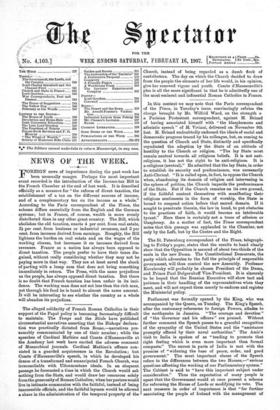The alleged solidarity of French Roman Catholics in their support
of the Papal 'policy is becoming increasingly difficult to maintain. The Temps and the Bade have published circumstantial narratives asserting that the Bishops' declara- tion was practically dictated from Rome,—narratives pre- sumably communicated by one of their number; while the speeches of Cardinal Mathieu and Comte d'Haussonville at the Academy last week have excited the adverse comment of Monarchical journals. Cardinal Mathieu's offence con- sisted in a guarded acquiescence in the Revolution; but Comte d'Haussonville's speech, in which be developed his dream of a transformed and emancipated French Church, was irreconcilable with Ultramontane ideals. In an eloquent passage he forecasted a time in which the Church would ask nothing from the State, and would draw her resources solely from the generosity of Roman Catholics; when berpastors would live in intimate communion with the faithful, instead of being inaccessible officials, and the faithful laymen would be allowed a share in the administration of the temporal property of the Church, instead of being regarded as a dumb flock of contributors. The day on which the Church decided to draw from the people the elements of her life would, in his opinion, give her renewed vigour and youth. Comte d'Haussonville's plea is all the more significant in that he is admittedly one of the most eminent and influential Roman Catholics in France.






































